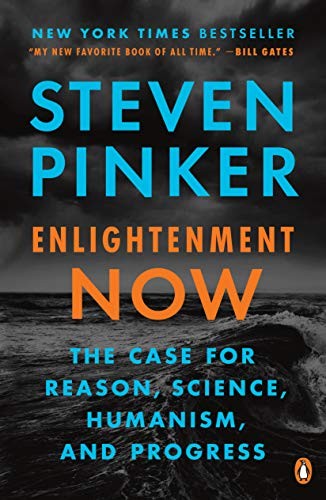Léo Varnet reviewed Enlightenment Now by Steven Pinker
Triomphe des lumières ou apologie du néolibéralisme ?
1 star
Dans "Le Triomphe des Lumières", Steven Pinker défend une organisation néolibérale du monde sous couvert de rationalisme. Il y a une contradiction patente dans ce texte : Pinker se fait le défenseur de la raison tout en émaillant son discours d'approximations, d'erreurs et de déclarations péremptoires. Au travers de deux billets de blog, je me suis appliqué dans un premier temps à relever ces erreurs de raisonnement, avant de m'intéresser à l'idéologie sous-jacente. Mon but était ici de ne pas m'arrêter à la constatation de la faiblesse argumentative de Pinker, mais de souligner que ses thèses s'inscrivent en fait dans une longue lignée d'apologies du néolibéralisme, reprenant parfois leur discours mot pour mot. dbao.leo-varnet.fr/2019/08/26/triomphe-des-lumieres-ou-faillite-de-la-raison/ dbao.leo-varnet.fr/2020/05/05/triomphe-des-lumieres-ou-apologie-du-neoliberalisme/
Dans "Le Triomphe des Lumières", Steven Pinker défend une organisation néolibérale du monde sous couvert de rationalisme. Il y a une contradiction patente dans ce texte : Pinker se fait le défenseur de la raison tout en émaillant son discours d'approximations, d'erreurs et de déclarations péremptoires. Au travers de deux billets de blog, je me suis appliqué dans un premier temps à relever ces erreurs de raisonnement, avant de m'intéresser à l'idéologie sous-jacente. Mon but était ici de ne pas m'arrêter à la constatation de la faiblesse argumentative de Pinker, mais de souligner que ses thèses s'inscrivent en fait dans une longue lignée d'apologies du néolibéralisme, reprenant parfois leur discours mot pour mot. dbao.leo-varnet.fr/2019/08/26/triomphe-des-lumieres-ou-faillite-de-la-raison/ dbao.leo-varnet.fr/2020/05/05/triomphe-des-lumieres-ou-apologie-du-neoliberalisme/


